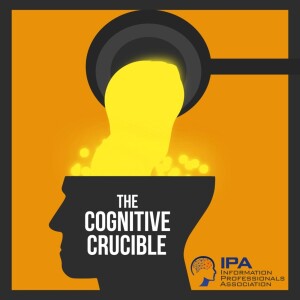
#98 Arun Seraphin on the SASC and Emerging Technology
 2022-05-31
2022-05-31
The Cognitive Crucible is a forum that presents different perspectives and emerging thought leadership related to the information environment. The opinions expressed by guests are their own, and do not necessarily reflect the views of or endorsement by the Information Professionals Association.
During this episode, Dr Arun Seraphin discusses his 20+ years as a Professional Staff Member on the staff of the United States Senate Committee on Armed Services. He describes differences between the US Senate and the House of Representatives, as well as the way Congress thinks about and evaluates national security emerging tech. Arun shares he communicates as a “connector” between emerging technology thought leaders in industry and academia and Congressional leaders. Finally, he describes NDIA’s Emerging Technologies Institute and how he continues connecting people and technology.
Resources:
- NDIA Emerging Technologies Institute
Link to full show notes and resources
https://information-professionals.org/episode/cognitive-crucible-episode-98
Guest Bio:
Dr. Arun Seraphin is the Deputy Director of Emerging Technologies Institute (ETI) at National Defense Industrial Association (NDIA). Before joining the ETI team, a Professional Staff Member on the staff of the United States Senate Committee on Armed Services. His areas of responsibility include acquisition policy, Pentagon management issues, Department of Defense’s science and technology programs, information technology systems, technology transition issues, defense laboratories, Small Business Innovation Research program, manufacturing programs, and test and evaluation programs. As such he assists Senators in their oversight of DOD policies and programs, including in the authorization of budgets, civilian nominations, legislative initiatives, and hearings. He rejoined the committee staff in 2014, after previously serving there between 2001 and 2010. In 2009, he was named one of ten Defense “Staffers to Know” by Roll Call, a Capitol Hill newspaper.
From 2010 to 2014, Dr. Seraphin served as the Principal Assistant Director for National Security and International Affairs at the White House Office of Science and Technology Policy (OSTP). During this time, he both led (in an Acting capacity) and served as the deputy director of the OSTP National Security and International Affairs division. His areas of responsibility included developing and implementing White House initiatives and policies in areas including defense research and engineering; weapons of mass destruction; defense manufacturing and industrial base; science, technology, engineering, and mathematics (STEM) education; cybersecurity; and promoting innovation in government research and engineering organizations. He also led interagency groups on small business programs and on improving the quality of the Federal STEM workforce. He was on detail to OSTP from the Defense Advanced Research Projects Agency (DARPA) where he was the Special Assistant for Policy Initiatives to the Director of DARPA.
Dr. Seraphin has also worked on the United States House of Representatives Committee on Science’s Subcommittee on Research as a professional staff member. He began his work in Congress in the Office of Senator Joseph Lieberman as the 1999-2000 Materials Research Society – Optical Society of America Congressional Science and Engineering Fellow. In these positions, he covered both civilian and defense research and development programs.
Between 1996 and 2000, Dr. Seraphin worked in the Science and Technology Division of the Institute for Defense Analyses, where his research included work on defense technology transition, microelectromechanical systems (MEMS), export controls, technology forecasting, and international research cooperation. His work included detailed technical analyses supporting the DARPA MEMS program, the Army Science and Technology Master Plan, and the Military Critical Technologies Program. In 1996, Dr. Seraphin earned a Ph.D. in Electronic Materials from the Massachusetts Institute of Technology, where he performed research on silicon nanotechnology. His research focused on the development of novel silicon nanostructures and tailoring their optical properties. He also holds bachelor’s degrees in Political Science with a concentration in American Government and Engineering Science with a concentration in Materials Science from the State University of New York at Stony Brook.
About: The Information Professionals Association (IPA) is a non-profit organization dedicated to exploring the role of information activities, such as influence and cognitive security, within the national security sector and helping to bridge the divide between operations and research. Its goal is to increase interdisciplinary collaboration between scholars and practitioners and policymakers with an interest in this domain.
For more information, please contact us at communications@information-professionals.org.
Or, connect directly with The Cognitive Crucible podcast host, John Bicknell, on LinkedIn.
Disclosure: As an Amazon Associate, 1) IPA earns from qualifying purchases, 2) IPA gets commissions for purchases made through links in this post.
More Episodes
 2023-05-16
2023-05-16
 2023-05-09
2023-05-09
 2023-05-02
2023-05-02
 2023-04-18
2023-04-18
 2023-04-11
2023-04-11
 2023-03-28
2023-03-28
 2023-03-21
2023-03-21
 2023-03-07
2023-03-07
 2023-01-24
2023-01-24
Create your
podcast in
minutes
- Full-featured podcast site
- Unlimited storage and bandwidth
- Comprehensive podcast stats
- Distribute to Apple Podcasts, Spotify, and more
- Make money with your podcast
It is Free
- Privacy Policy
- Cookie Policy
- Terms of Use
- Consent Preferences
- Copyright © 2015-2024 Podbean.com





